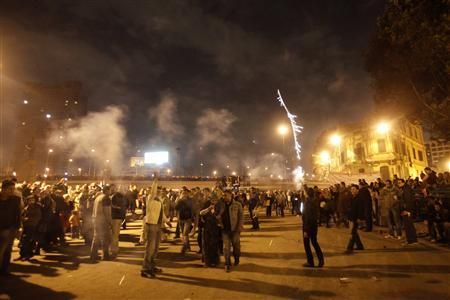
The toppling of President Hosni Mubarak following a popular uprising was greeted by scenes of jubilation in Cairo and wild celebrations on the streets of Gaza, but in Israel, Friday's dramatic events were met with silent anxiety.
It is hard to overstate the importance to Israel of its 1979 peace accord with Egypt, which has given it stability on its southern flanks and has helped successive Israeli leaders maintain the status quo in the unresolved Palestinian conflict.
A future Egyptian government is unlikely to tear up the historic Camp David peace treaty, because such a move could deprive it of crucial U.S. aid. However, most analysts foresee a more testy and uncomfortable ties in the years ahead.
"This has left us dangerously isolated. Egypt was our only strategic partner in the region," said Alon Liel, a former director-general of Israeli Foreign Ministry.
"In the future, Egypt will have different relations with Israel. More hostile and more unpredictable," he added.
Mubarak ruled Egypt for three decades, dealing with eight different Israeli prime ministers during that period and providing them a vital anchor of certainty as they continued to strike out against numerous enemies across the Arab world.
Egypt is the only Arab state to still have an ambassador in Israel and has played an important role in helping contain the Islamist group Hamas, which governs Gaza and has close links to the Muslim Brotherhood -- a potential winner in Egypt's turmoil.
Hamas has already urged Cairo to relax its strict border controls with Gaza that Israel says are vital to prevent the flow of arms into the coastal enclave.
A new leadership in Cairo is bound to take time to settle in and it is impossible to predict at this stage who will hold the real power, but it seems very unlikely that whoever takes charge will continue with Mubarak's benign policy towards Israel.
The Iran Nightmare
Many Jewish leaders fear that Egypt will follow the path of Iran, which created an Islamic republic after the overthrow of the Shah and has threatened to wipe Israel off the map.
"Egypt is not a similar earthquake to Tunisia, but rather what happened in Iran," said Major General Aharon Ze'evi Farkash, a former director of military intelligence. "However, I think it will all take time, and we will be able to prepare."
If such a scenario plays out, it would jeopardise Israel's remarkable, recent economic expansion, which has given it per capita GDP of some $30,000 a year against just $6,200 in Egypt.
Israel imports 40 percent of its gas from Egypt and Islamist militants have already taken advantage of the political chaos this month to blow up desert pipelines, disrupting supplies.
The peace treaty has allowed Israel to keep a minimal presence on its 250-km (160 miles) border with Egypt, freeing up forces for the more troubled northern and eastern flanks, but the military is likely to want to review that.
That could have implications for defence spending, which has fallen to around 7 percent of gross domestic product today from some 25 percent before the peace accords.
Israel is unlikely to make any hasty budget changes, for fear of sending hostile signals, and Israeli Prime Minister Benjamin Netanyahu will almost certainly pursue a low-profile approach to avoid fanning extremist flames.
However, the Egyptian upheaval has already sparked a frantic review of strategic options and fuelled fears that a new Arab order will be more effective in resisting core Israeli policies.
"These include pursuing a farcical peace process, the Gaza closure and other policies ... which public opinion in the Arab world opposes," said Daniel Levy, a senior research fellow at the New America Foundation and former Israeli peace negotiator.
"This could become the main difference. Arab public opinion now matters," he said in emailed comments.
Pressure for Peace Talks
Peace talks aimed at ending the Middle East conflict foundered last year and Palestinian leaders say they will not return to negotiations until Israel halts settlement building on land it seized in a 1967 war.
Mubarak played for many years the role of the honest broker in the peace process -- a calming influence that analysts say greatly helped Israel keep a lid on Palestinian passions.
Leading figures on Israel's dominant political right believe the uncertainty in Egypt makes it impossible for them to offer the sort of concessions needed to secure a peace deal and say in private that the best option is to batten down the hatches.
But some analysts believe the televised Arab revolts might reignite a disaffected Palestinian people and say Israel must re-engage with the moderate leadership in the West Bank.
"If everything is on fire in our neighbourhood, let's try and extinguish our own fire first with the Palestinians because that might help everything," Shimon Shamir, a former ambassador to Egypt and respected academic, told a recent conference.
That is easier said than done, but Netanyahu is likely to face mounting pressure to revive meaningful discussions.
"The one thing ... that drives nearly everything in this region, and which has global ramifications if not addressed, is a peace process that shows some promise of near-term promise," said former U.S. National Security Advisor, Gen. James Jones.
"The status quo is simply not sustainable as extremist ranks will only grow in the absence of real and visible progress," he told the annual Herzliya Conference this week.



Ohh booo hoo poor Zionists, Tyrants around the world are crumbling, they are running out of allies fast and now it's Ohh poor us!
"The political earthquake in Egypt has sent shockwaves through Israel, shredding decades-old security assumptions and leaving the Jewish state to face more turbulent, demanding relations with its powerful neighbour."
Yeah cause hopefully the new Egyptian government will see through the charade and stand up for whats right, how bout a whole bunch of pissed off Egyptians demanding that Isreal shed itself of it's Zionist masters and embrace their true values of peace.